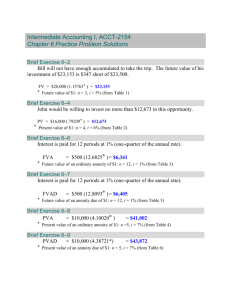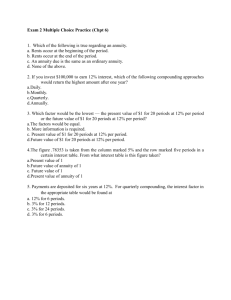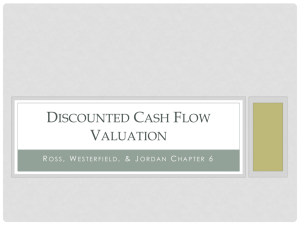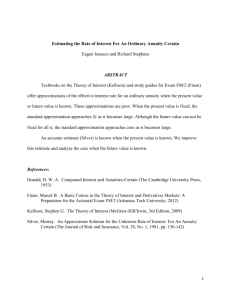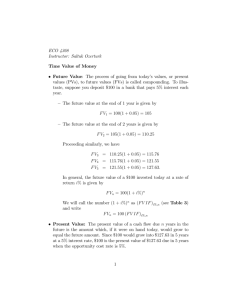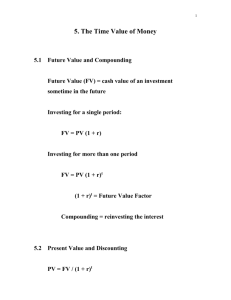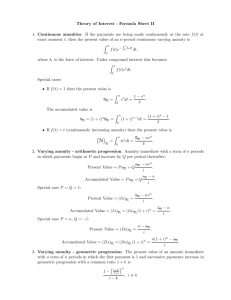As always, should you or any cell in your brain be fried or fail, the
advertisement
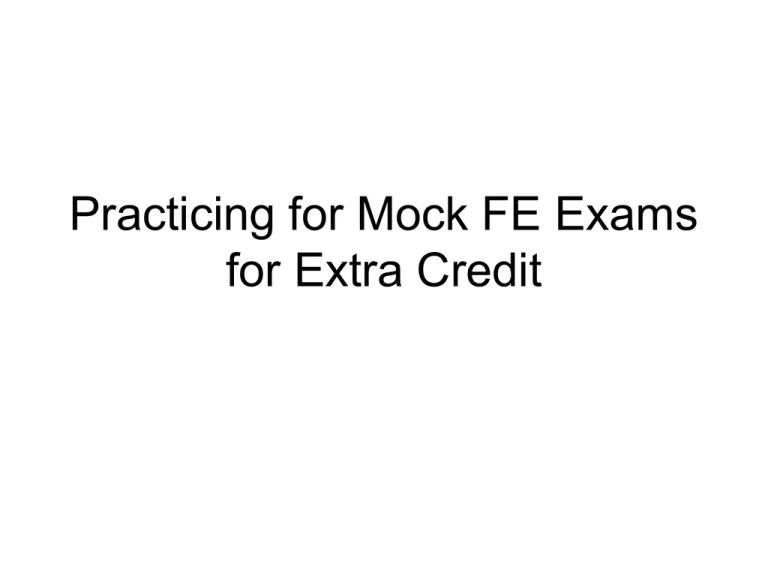
Practicing for Mock FE Exams for Extra Credit How does the Mock FE Exam Work • Times are posted on the web under “Where We Are” for Mock FE exam times • You report at the appointed time armed with a pencil and a simple calculator with no program storage capability. • You will be handed a Formula and Table Book, a fun scribble in the circle answer sheet, and a test booklet. • At the appointed time you will be able to turn over your test booklet and begin. • You will have 18 minutes to solve 9 problems. Continued Mock FE Exam • The test book and answer sheet are gathered up • Next the “Afternoon” Session exam and answer sheet is passed out. – It will have 6 questions and 24 minutes to solve everything (4 minutes per question) • After 24 minutes the answer sheet, test booklet, and formula booklet are gathered up. So What is this Great Slide Show? • It is a training exercise for these mock FE exams • First the slides give you 6 “Morning Session” like problems. • Download the formula book and print it out • Time yourself and give yourself 12 minutes to solve the problems. • At the end of the 6 problems is an answer key to check your answers More on Using this Slide Show • After the answer key are worked solutions to the 6 problems in case you need to see how the problem could be worked. • Next there are 4 “Afternoon” Session like problems. • Give yourself 16 minutes and try to work the problems. • After the 4 problems is an answer key and then worked solutions. Your Mission • Jim, should you decide to accept it is to train your brain to pass these mock FE exams and improve your grade in the class. • As always, should you or any cell in your brain be fried or fail, the instructor will disavow any knowledge of your actions. Problem #1 • There Goes Your Cash money store lets you write a check they will cash in 1 month. You write a check for $120 and they give you $100 today. The effective annual interest rate is most nearly – A- 20% – B- 240% – C- 792% – D- 1000% Problem #2 • Lanny Lamebrain borrows $10,000 from Larry Loanshark at 50% simple interest. The loan will be paid back in 5 years in a lump sum. How much will Lanny Lamebrain have to pay Larry? – A- $5,000 – B- $15,000 – C- $25,000 – D- $35,000 Problem #3 • Brian Bankborrow takes a personal loan for $10,000 from a bank at 12% effective annual interest compounded monthly and repayable in monthly payments over 5 years. How much interest will he pay the first month? – – – – A- $5 B- $12 C- $100 D- $1200 Problem #4 • Brian Bankborrow takes a personal loan for $10,000 from a bank at 12% effective annual interest compounded monthly and repayable in monthly payments over 5 years. Most nearly what will be the amount of his monthly payments? – – – – A $60 B $100 C $222 D $1200 Problem #5 • Saluki University invests $10,000 in a new brain for its Chancellor. The brain has a salvage value of $1,000 after 9 years of use and will be depreciated by straight line methods. The annual depreciation on the brain is most nearly – – – – A- $9 B- $100 C- $1000 D- $1120 Problem #6 • Saluki University considers installing coin operated toilet paper dispensers in the bathrooms. A dispenser costs $1200 and collects 25 cents for each lot of toilet paper it dispenses. Maintenance and supply costs are 5 cents for each lot of toilet paper. Most nearly how many lots of toilet paper must be dispensed to break-even on the cost of the toilet paper dispenser? – – – – A – 1200 B- 6000 C- 24,000 D- 50,000 Answer Check Sheet • • • • • • 1 - C 2- D 3- C 4- C 5- C 6- B Doing Problem #1 • One must first find the 1 month period interest rate – $120 check provides $100 cash and $20 interest to be accrued over 1 month – $20 is 20% of 100 • Thus the period or one month interest rate is 20% • Next one uses the formula for F/P with adaptation to isolate the interest rate after compounding. n ((1i) 1) *100 Solving • Substituting in 0.2 (or 20%) interest and n=12 (for 12 compounding periods in a year) the result is 791.6 • This is quite close to 792% for answer C Solving Problem #2 • The formula for simple interest is – Loan Amount * Rate * Number of Periods = interest – The interest is added to the loan amount to get the total payment – $10,000 * 0.5 * 5 = $25,000 – Plus the $10,000 originally borrowed – Gives $35,000 – Answer D is $35,000 Solving Problem #3 • One first has to get the monthly interest rate. – Annual rate is 12% divided by 12 months in a year is 1% • Next one charges 1% interest on $10,000 – $10,000 * 0.01 = $100 • Answer C is $100 Solving Problem 4 • One first needs to get the period interest rate for 1 month. – 12% interest over 12 months = 1% per month • One next uses A/P at 1% interest with 60 payments (12 months per year for 5 years) – From the 1% interest table for n= 60 A/P is 0.0222 – $10,000 * 0.0222 = $222 • Answer C is $222 Solving Problem 5 • Straight Line Depreciation is ( InitialVal ue SalvageValue) LifeofAsset Putting in $10,000 initial value and subtracting $1000 salvage value Gives $9,000 for the numerator The life of the asset is 9 years $9,000/9 = $1000 Answer C is $1000 Solving Problem 6 • This is an algebra type of problem – The profit on each lot of toilet paper is 25 cents – 5 cents or 20 cents – The cost of the toilet paper dispenser is $1200 – $1200 = X*0.2 – Solving for X, X = 6000 • Answer B is 6000 Afternoon Session • Questions 1 to 4 refer to the following scenario • Saluki University plans to install a group of buildings called Dog Bone Way which will consist of a new Football Stadium, Remodeled Basketball Stadium, a new Student Services Building, and a class room building for 83 million dollars of which 10 million was raised from donations before the project was complete. Saluki University will borrow the rest of the money at 4% interest and pay it back from student fees and donations. Question 1 • If the Dog Bone Way buildings cost $8,000,000 per year to service and maintain over the next 20 years what is the total equivalent annual cost of the project if the original 10 million in donations is deducted from the project’s initial cost? – – – – A - $5,400,000 B - $8,000,000 C- $12,100,000 D- $13,400,000 Question #2 • The City of Carbongale offered to raise it’s sales tax by ½% in order to provide $1,000,000 per year for 20 years to the Dog Bone Way project. What is most nearly the present value of Carbongale’s contribution? – – – – A- $13,600,000 B- $15,100,000 C- $20,000,000 D- $29,800,000 Question #3 • Saluki University proposed to pay for the educational enhancement provided by the new facilities with a $128 per semester fee increase. If the average enrollment for two semesters per year was 18,000 students paying $128 each semester for the next 20 years, most nearly what would the present value of the contribution be? – – – – A- $2,300,000 B- $4,600,000 C- $62,600,000 D- $67,000,000 Question 4 • If the $8,000,000 per year in maintenance on the Dog Bone Way facilities is presumed to go on indefinitely, what is the capitalized cost of that maintenance at the present time? – A - $8,000,000 – B- $13,500,000 – C- $20,000,000 – D- $200,000,000 Answer Key • • • • 1–D 2- A 3–C 4-D Solution to Question #1 • Equivalent annual cost is much the same as total life cycle cost. One discounts all the money back to the time when the asset enters service (assumed to be time 0 in this case). Then one uses an A/P to convert that cost to an equivalent annuity. – One recognizes $8,000,000 is already an annuity – All one has to do is convert the remaining capital cost of $73,000,000 into an annuity over 20 years. Solution #1 continued • Looking up A/P from the 4% interest table for n=20 one finds 0.0736 • $73,000,000 * 0.0736 = $5,373,000,000 • Combine this with the $8,000,000 in annual maintenance costs and one gets about $13,373,000 • Answer D is $13,400,000 Solution #2 • Carbongale is offering $1,000,000 per year for 20 years. This is an annuity. The question is what is the NPV of that annuity. • We can solve this as $1,000,000 * P/A at 4% interest for 20 years • Looking at the 4% interest table for 20 years one sees the P/A value is 13.59 • $1,000,000 * 13.59 = $13,590,000 • Answer A is $13,600,000 Solution #3 • • • • • • Question #3 is another annuity The amount is 18,000 students X 128 per semester X 2 semesters per year $4,600,000 per year The 13.59 P/A value for 20 years at 4% remains the same • $4,600,000 * 13.59 = $62,515,000 • Answer C is $62,600,000 Solution #4 • The 4th question involves an $8,000,000 per year annuity that goes on indefinitely. The capitalized cost refers to the present value of that annuity. • For an “infinite” annuity – NPV = Annuity/ Interest rate • $8,000,000 / 0.04 = $200,000,000 • D is $200,000,000
